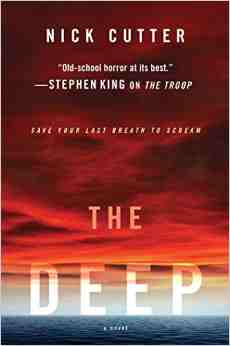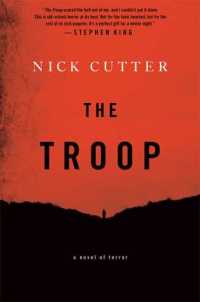The Deep by Nick Cutter
 Friday, February 27, 2015 at 8:25AM
Friday, February 27, 2015 at 8:25AM 
Published by Gallery Books on January 13, 2015
If this is the apocalypse, Luke Nelson thinks, at least it is orderly. People get the Spots, then they get the `Gets, then they wander away with blank minds. Luke's brother Clay, eight miles deep in the ocean near Guam, might have the answer to the phenomenon.
The Deep falls into the "strange entity discovered at the bottom of the ocean" subgenre of horror novels. The entity, nicknamed "ambrosia," has properties unlike any substance known to science. Ambrosia appears to have the curative powers that humanity needs in a time of crisis. Of course, this is a horror novel so the reader knows better, thanks in part to clues that Nick Cutter plants about its true nature. One of those clues is delivered in mysterious messages written in a submarine that returns from Clay's base in the Mariana Trench.
Cutter does a reasonable amount of character building although he sometimes slows the story's pace with flashbacks to Luke's past. Luke carries the scars of a difficult childhood and the guilt of allowing his son to go missing under his care, events that make him wish he would become afflicted with `Gets and forget everything that haunts him. I understand the technique of prolonging tension by cutting away from the present to talk about the past, but Cutter's frequent resort to that device is sometimes frustrating. For the most part, however, Cutter steadily builds a sense of dread, conjuring primal fears and encouraging the reader to share them with Luke.
A few too many scenes tell us about the characters' dreams. That often strikes me as something writers toss into a book to fill pages when they can't think of a creative way to advance the plot. The dreams are relevant here because they are presumably influenced by sinister forces at the bottom of the ocean, but horror-filled dreams seem like a cheap way to fill the pages of a horror novel. The characters' waking fantasies ("did I see/feel/hear that or am I hallucinating?") do a better job of provoking shivers.
But what about the bottom line? Parts of the book (particularly a diary written by one of the scientists on the ocean floor) are decidedly creepy. Parts of the book are at least borderline scary. The plot threads connect in a way that might be difficult to accept, but horror novels demand that disbelief be suspended before opening the book so that did not bother me. The nemesis that threatens Luke and the rest of humankind is formulaic -- in fact, it echoes the nemesis in Cutter's last novel, The Troop -- but Cutter wields the formula deftly.
A passage that describes Luke's work with stray dogs is quite moving. Other parts of the book that attempt to explain characters and their motivations are founded on clichés. But still, the ending -- the explanation for all the horror -- is clever. I like the way it plays with the meaning of evil. This isn't a deep book but, as horror novels go, it is at least slightly better than average.
RECOMMENDED
 TChris |
TChris |  Post a Comment |
Post a Comment |  Nick Cutter,
Nick Cutter,  horror in
horror in  Science Fiction
Science Fiction 